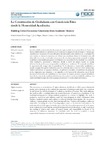La construcción de ciudadanía con conciencia ética desde la honestidad académica

Ver/
Use este enlace para citar
http://hdl.handle.net/2183/32254
A non ser que se indique outra cousa, a licenza do ítem descríbese como Atribución-NoComercial-SinDerivadas 3.0 España
Coleccións
- GI-GIACE - Artigos [35]
Metadatos
Mostrar o rexistro completo do ítemTítulo
La construcción de ciudadanía con conciencia ética desde la honestidad académicaTítulo(s) alternativo(s)
Building Ethics Conscious Citizenship from Academic HonestyData
2022-06-27Cita bibliográfica
Pérez-Crego, M. C., Muñoz-Cantero, J. M. y Espiñeira-Bellón, E. M. (2022). La construcción de ciudadanía con conciencia ética desde la honestidad académica. REICE. Revista Iberoamericana sobre Calidad, Eficacia y Cambio en Educación, 20(3), 123-143. https://doi.org/10.15366/reice2022.20.3.007
Resumo
[Resumen] La universidad, como institución de educación superior, debe tener como objetivo ofrecer una buena calidad educativa y promover en el alumnado la adquisición de principios y valores que contribuyan y favorezcan el desarrollo pleno del alumnado como miembro de la sociedad. En este estudio, se aborda la necesidad de ofrecer una enseñanza donde la formación ética del alumnado sea un eje vertebrador del proceso de enseñanza-aprendizaje tomando el plagio académico como medio para poner en evidencia esta necesidad. Se ha diseñado un estudio de corte cualitativo, transversal e inductivo, donde a través de grupos focales se recoge información de profesorado, responsables académicos y estudiantes. El alumnado manifiesta la importancia de otorgar valor al aprendizaje. Y, los docentes y responsables académicos a asumir un papel de soporte formativo, unos/as a nivel de aula y otros/as a nivel institucional. Ambos concuerdan en aspectos similares, los primeros centrados en cuestiones de actuación en las asignaturas que imparten y, los segundos a nivel general de educación, con el fin de favorecer la formación de ciudadanos/as con valores de respeto, justicia y responsabilidad en favor de la evitación de conductas deshonestas. Se concluye con la necesidad de establecer una responsabilidad compartida entre la propia institución y la comunidad universitaria. [Abstract] The university, as an institution of higher education, should aim to offer a good educational quality and to promote in the students the acquisition of principles and values that contribute to and favour the full development of students as members of society. This study addresses the need to offer a teaching where the ethical formation of students is a backbone of the teaching-learning process taking academic plagiarism as a means to highlight this need. A qualitative, transversal and inductive study has been designed, in which information from teachers, academic leaders and students is collected through focus groups. On the part of students, it means giving the value that learning really has. Teachers and academic leaders are responsible for taking on a role of training support, some at the class level and others at the institutional level. Both agree on similar aspects, the first focused on questions of performance in the subjects they teach and the second at the general level of education, in order to promote the training of citizens with values of respect, justice and responsibility in favour of the avoidance of dishonest behaviour. It concludes with the need to establish a shared responsibility between the institution itself and the university community.
Palabras chave
Educación superior
Plagio académico
Ética
Valores
Ciudadanía
Higher education
Academic plagiarism
Ethics
Values
Citizenship
Plagio académico
Ética
Valores
Ciudadanía
Higher education
Academic plagiarism
Ethics
Values
Citizenship
Versión do editor
Dereitos
Atribución-NoComercial-SinDerivadas 3.0 España
ISSN
1696-4713






